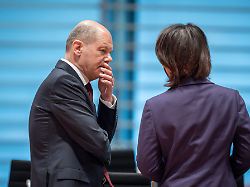Who’s in charge?
Berlin will probably do without a national security council
03/11/2023 12:22 p.m
War has been raging in Europe for more than a year – and the federal government was actually unanimous: A national security council is needed. But it probably won’t get that far. According to a report, neither Chancellor Scholz nor Foreign Minister Baerbock want to relinquish powers.
According to a report by “Spiegel”, the federal government will not set up a national security council. According to this, Chancellor Olaf Scholz from the SPD and the Green Foreign Minister Annalena Baerbock could not agree on where the new body will be located, who will lead it and how it will be filled, despite months of negotiations. It was therefore decided not to pursue the whole project any further. The paper reports that the idea is off the table, citing negotiators.
The dispute over a new security policy body has recently dominated the internal discussion between the chancellery and the foreign ministry about the “national security strategy”. According to the report, both houses initially agreed that a quorum meeting regularly on security issues would be appropriate in times of war and crises. However, both the Chancellery and the Foreign Ministry saw responsibility for this as their own.
Behind the conflict was apparently also a question of power, which was about who is in charge of German foreign policy. According to the report, the Federal Foreign Office did not want to hand over any further powers to the Chancellery, where important decisions are already being made, for example in European policy or in support of Ukraine. The Chancellor’s Office, in turn, was opposed to subordinating a group with executive powers to the Foreign Office.
According to the report, the Federal Foreign Office and the Chancellery are now limiting themselves to the existing security policy formats: In sensitive cases, the Chancellor can therefore convene the security cabinet with ministers from the departments dealing with security issues, and the intelligence situation also meets once a week. According to the chancellor’s office, that’s enough and the foreign office is relieved that it doesn’t have to cede any further powers. “Continue as before,” according to the report, is the compromise.
